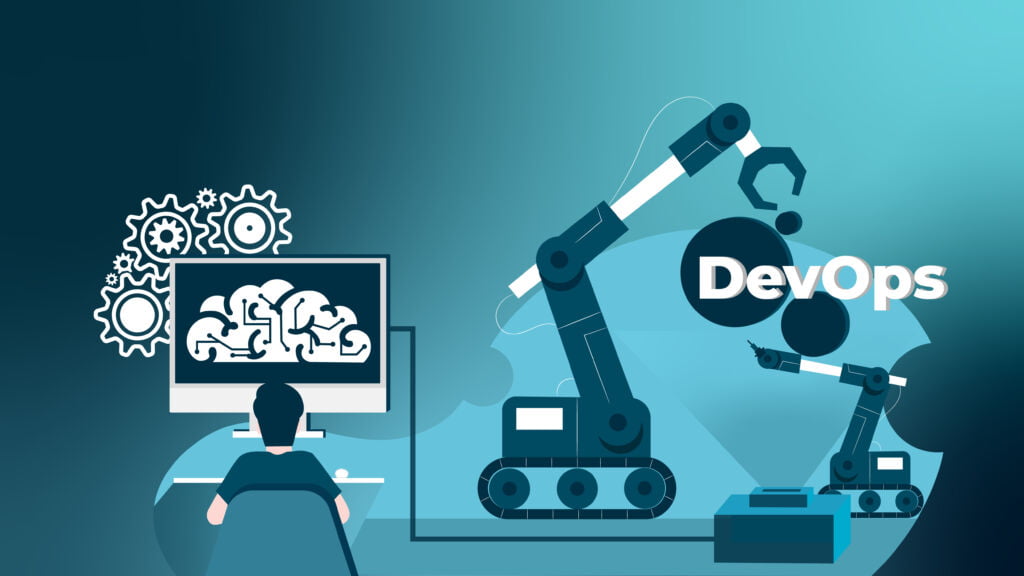The DevOps Engineer is a renaissance man in the IT world. They must have a strong technology background, know scripting languages, and feel at home around servers and in the cloud. They automate, deploy, update and maintain, speeding up code development and solution delivery. For an IT team, they are worth their weight in gold.

DevOps combines the best practices of software production and administration
Humans are the weakest link in IT systems. It is through their oversights that security incidents or leaks most often occur. Getting rid of the “protein interface” is considered to be the holy grail. The way to do it is by automating administration and taking a holistic view of software management. Historically, the two worlds rarely intersected, and working in isolation did little good. This needed to change.
DevOps – what is it?
The name itself may hint at how the DevOps concept came about. It is a combination of the words “development” and “operations”. A good IT engineer must not only know the infrastructure and technologies being used, but also be able to manage and optimize them. It is not just a matter of setting up a server and installing the right applications. The art lies in automating the whole sequence of events from A to Z.
In the ideal DevOps world, the push of a single button should start the whole process, which consists of creating a machine and getting it to a state that lets you invite people to use it. This is intended to help reduce the time it takes to deliver software. And faster results also mean lower costs. That is why the demand for DevOps engineers has skyrocketed in recent years. There’s a shortage of specialists in many fields, so automation that allows you to reduce the amount of work is very valuable.
Optimization never ends
The IT world is growing so fast that the potential for automation is not going to run out for a long time to come. Especially that one of the basic principles is the approach of continuous integration, continuous deployment and continuous software delivery. This provides a set of best practices that allow to combine frequent changes in code with the stability of system operation.
The DevOps Engineer uses, among other things, standardized configurations, automated tests and restart or rollback procedures. Although they do not spend most of their time programming, they must be able to code the above actions and also read code to communicate with backend developers. On top of that, they also work with either testers, designers or the business people, adjusting the level of technical complexity to the target audience. The DevOps Engineer is therefore an all-rounder that combines soft and hard skills, programming with administration, and efficiency with savings for the employer.
What must the DevOps Engineer be expert in?
- Operating systems: Linux or Windows,
- Server management,
- Software testing,
- A scripting language: Python, Perl, Bash, Go or Ruby. Knowledge of additional programming languages such as C, C++, Java, .NET or PHP is a big plus in the job market,
- Automation tools,
- Cloud computing support (AWS, Azure and GCP).
What automation tools can a DevOps Engineer use?
- Git – version control,
- Kubernetes – resource management, scaling, automated environment creation,
- Jenkins – creating automated processes,
- Selenium, Ansible – software testing automation,
- Puppet – server configuration,
- Jira, Asana – project management.
DevOps and earnings
The Bulldogjob website points out that statistically the salary strongly depends on the form of cooperation. Experienced specialists more often than beginners decide to set up their own business. In that case they issue invoices for an average of 17 thousand PLN every month. Co innego na umowie o pracę, gdzie pensja na rękę wynosi średnio 8 tys. zł.
NoFluffJobs situates the median between 10 thousand and 16 thousand PLN pre-tax on an employment contract. On a B2B contract it is already expected to be between 15 and 20 thousand PLN.
Some terms that a DevOps Engineer should know:
Kanban – is a project management method focused on workflow. This can be visualized using a kanban board, which is often divided into areas such as: “to do”, “in progress” and “done”. It allows you to quickly assess the status of a project and plan the next steps.
Agile – an alternative project management method in which large parts of the project are broken into smaller pieces and grouped into sprints. Sprint tasks should be delivered within a certain timeframe and then reviewed by the client. It works well in flexible environments and with clients who want to control the progress of work.
Waterfall – a different and more traditional method of project management. It involves performing activities one after another in a specific order. It does not focus on quick delivery of results, but rather on methodical progress – according to a specified plan and budget.
DevOps pipeline – a set of tools and processes that enable code to be built and moved between environments. This is the basis of the continuous integration, continuous deployment or continuous delivery approach, which uses, among other things, automated testing.
Version control system – software that tracks changes in the code of a solution. Necessary for complex projects where many people are working on sections of code at the same time. Without this system, work management would be much more difficult.

